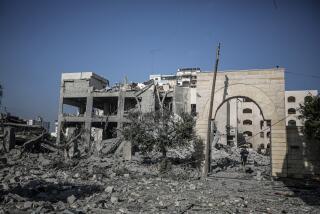Searching for Pages Torn From History
PRISTINA, Yugoslavia — Mehmet Gerguri measures the library’s loss not in books so much as in time.
Most Albanian-language material from the 1970s and ‘80s is gone, truckloads of it shipped out in 1991-92 by Serbian administrators to be shredded and turned into cardboard, said Gerguri, the ethnic Albanian director of the National and University Library here.
And virtually no Albanian-language works were added during the 1990s after 99 Albanian library workers--including Gerguri--were fired in a Serbian purge of the work force.
That’s 30 years of Albanian books missing from the official repository of literature, science and technology in Kosovo province, where the population is 90% ethnic Albanian.
Librarians have so far been unable to identify all the missing material because that would entail matching the massive old-style card catalog with the 650,000 volumes that should be on the library’s shelves.
But in a 1997 international appeal for intervention--which went unheeded--Gerguri used witness accounts to estimate that at least 100,000 books, more than 8,000 magazines and six truckloads of newspapers had been culled from the collection by the regime of Yugoslav President Slobodan Milosevic.
The stacks now are largely filled with Serbian-language books, augmented by works in English, German, French, Russian and other foreign languages.
The National Library, a reading library that doesn’t lend books, was the headquarters for the province-wide network. Many of the buildings themselves were destroyed by Serbian forces during the mayhem surrounding the North Atlantic Treaty Organization bombing campaign against Milosevic this spring, Gerguri said.
“They wanted everything that was Albanian to be pushed away, if it was not destroyed,” Gerguri said. “We hope we’ll manage to rebuild it, and that we’ll have all the copies of the titles in Albanian.”
How to rebuild is the problem. The library plans to appeal to ethnic Albanians to donate their private book collections, although it’s unclear how many private libraries survived Serbian wartime looting.
And while 68 of the former Albanian employees have returned, there’s no money for paychecks. With no formal Kosovo government, Gerguri has no place to send the six-month, $780,000 budget he drafted for salaries, acquisitions and operating expenses.
Noted Albanian historian Skender Rizaj, 70, who has published about 20 books and 200 academic articles on world history, said he fears that the loss of the materials will be a severe impediment to young Kosovo Albanians who want to study their own history.
“It will be very difficult for all students,” Rizaj said as he sat at a small plastic table on a shaded patio at his house. “Our library was poor to begin with, compared to libraries in London and Paris. And now it will be even poorer, so this is a very big loss.”
The library was designed by Adrija Mutnjakovic, a well-known Croatian architect, and was finished in September 1981. It quickly became the subject of Serbian accusations that it “was the center of Albanian nationalism and counterrevolution,” Gerguri said.
The building itself occupies tens of thousands of square feet beneath a staggered series of milky glass domes that some--particularly Serbian critics--say were intended to symbolize traditional white Albanian caps encased in steel bars or chains.
“Maybe so,” Gerguri said. “But for me, these serve the function of getting natural light. It’s the best light we could get.”
Although ethnic Albanians across Kosovo have been targeting minority Serbs in a campaign of violence since the bombing ended and U.N. peacekeepers moved in, Gerguri said library workers have no intention of jettisoning the Serbian collection.
“We are not going to do what they did to our books,” he said.
More to Read
Sign up for Essential California
The most important California stories and recommendations in your inbox every morning.
You may occasionally receive promotional content from the Los Angeles Times.











